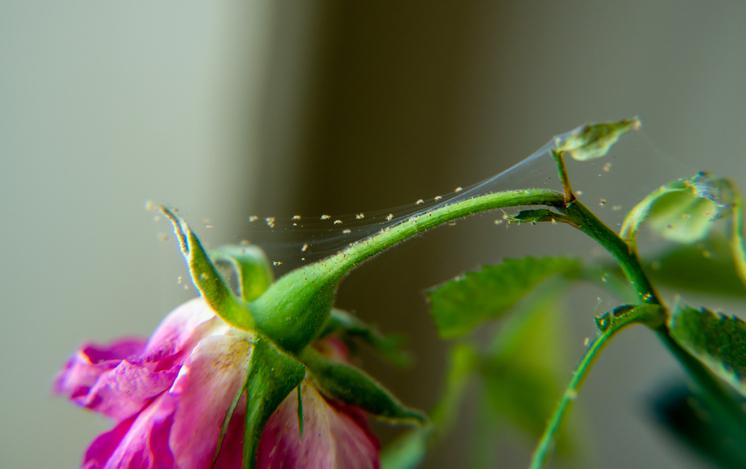The Menace of Spider Mites
Posted by Mosquito Squad
April 9, 2024

Author: Emma Grace Crumbley, Entomologist
Spider mites are very small arachnids in the class Acari, the same as ticks. Spider mites are a common garden pest throughout the United States, usually found clustered on plants.
Unlike scabies mites or chiggers, spider mites are entirely herbivorous, meaning they are more excited about eating your plants than they are about biting you. Aside from plant damage, spider mites are not known to be medically important. There are no diseases, allergies, or infections known to be associated with spider mites.
Though individuals can be challenging to see with the naked eye, spider mites have three traits that reveal their presence:
- Webbing that looks dusty on plants.
- Clusters of mites during high seasons.
- Damage done to plants the spider mites are feeding on.
Spider Mite Damage
Spider mites have specialized mouthparts that allow them to suck up fluids out of plant cells. These mites are adept at piercing plants and eating the cell material inside, letting them feed on and damage a wide variety of vegetation.
Damage can range from minor aesthetic damage, where plants develop yellow spots and a dusty appearance, to fatal damage, where plants can die after being overrun by mites. In agriculture, spider mites are a significant concern for crop health. Homeowners with ornamental plants inside and outside should also be aware that spider mites can damage these non-crop plants to a lesser degree.
Spider Mite Control
Prevention is the first key to controlling any pest. Be sure to check your plants routinely for signs of damage. Quarantining new plants can also help prevent an active mite infestation from spreading to nearby plants, especially when bringing in plants from outdoors.
If you are dealing with an active spider mite infestation, there are a few control options you can try to decrease mite presence on your plants.
-
Dust Your Plants
Spider mites leave behind fine silk webbing. This webbing is a sign of a spider mite problem, and frequently removing it and dusting your plants will discourage spider mites from feeding and congregating.
- Wash Your Plants
If dusting does not help, spraying plants with plain water can. Some online sources recommend mixing water with soap and rubbing alcohol, but these mixtures can damage the plant if overapplied or made with harsh ingredients. Routine washing with plain water should work well.
- Promote Outdoor Biodiversity
For plants in an outdoor garden, many natural predators, including ladybeetles and lacewing larvae, help control mite populations. Keeping a diverse outdoor ecosystem that allows beneficial insects to thrive can also help reduce mite problems.
